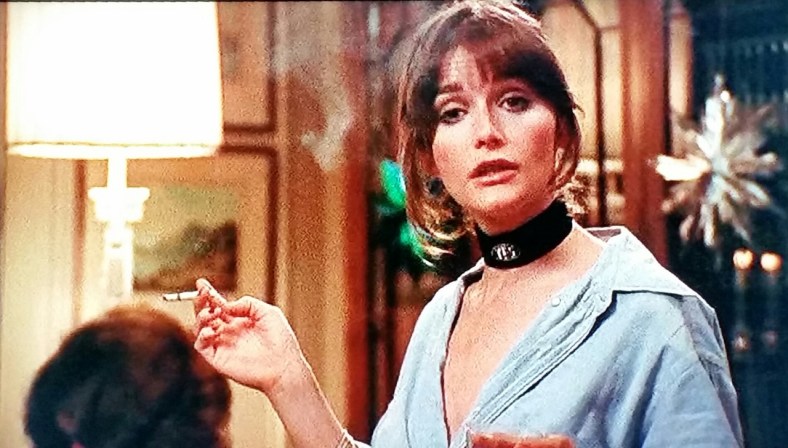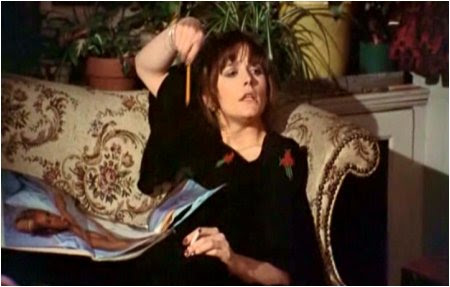Barb From ‘Black Christmas’ (1974) Is A Bisexual Icon

As a bisexual horror lover, I’m constantly searching for a crumb of representation of my sexuality in my favorite genre. And, as many queer horror fans know, it’s hard to find any LGBTQ+ representation — although that’s been changing in recent years. We often project onto characters and villains, reading between the lines to find a queer interpretation of classic horror texts to find acceptance and representation on screen. Such is the case for me and my bisexual queen, Barb (played by the incredible Margot Kidder) from Bob Clark’s 1974 proto-slasher Black Christmas.
To be fair, there is some evidence of Barb’s sexuality in the film, though it’s never fully expressed or explored. In one scene, a drunken Barb slurs a monologue about turtles having sex for three days straight and she can barely get three minutes out of a man. Just moments before, she’s seen looking at the centerspread of Playboy. A naked woman’s body is shown for an instant, quickly insinuating Barb’s attraction to women. In just one scene, the outspoken sorority sister is hinted to have more complexity than meets the eye. She is more than a sharp tongue and a glass of whiskey; she is a woman wearing armor made of wit and liquor to protect herself from judgment. Though admittedly that wit veers into incredibly inappropriate as she talks about townies.

Related: All of 1974’s ‘Black Christmas’ Characters Ranked Worst to Best
More than that, Barb reminds me of myself and the invisibility I often feel around my sexuality. I’m often guarded about being my authentic self even around friends in fear of being judged for my sexuality. On top of that, I’m in a relationship with a man, which brings my identity into further questioning. I feel as if I’m invalidating myself in a straight-presenting relationship. But then if I was with a woman, I’d be read as a lesbian. But at least my queerness would be taken seriously. It feels like a neverending battle to be seen as who I truly am.
When I do come out to someone, I’m often met with a slew of questions about my dating history and if I’ve been with a woman. I’m scrutinized. It’s like I have to pass a test to be validated as a queer person. And when I give my answers, I say them quietly and with hesitation. I’m not sure what reaction I’ll get. Will I be accepted? Or will I be told that I’m not gay enough? It’s exhausting.
So, like Barb, liquor and dark humor have been a way to protect and defend myself. More often than not in social settings, sexuality is never discussed. But I still feel like I need to protect myself in case it does creep into the conversation. Being funny will distract others from the truth, right? At least that’s what Barb and I think.
Related: The MKE Sisters of ‘Black Christmas’ (2019) Fight Back [Matriarchy Rising]
Barb exists in an incredibly feminine setting, a sorority house full of femmes with male partners. She’s the only main character without a boyfriend, instead sporting a glass of whiskey as her plus one. Barb is both part of the in-crowd while also existing on the periphery, a woman with friends who don’t really know her. It’s an experience many queer people are all too familiar with: performing a role that’s more palatable when in a predominantly heteronormative setting. Clark shines a brief, yet important, light on a woman hiding her sexual identity through a personality that isn’t altogether palatable, but still makes her charming in a mean way. It’s better than people knowing the truth.
While I project much of my own personal experience onto Barb, Clark does portray her as bisexual. Her reading a Playboy with no rude or witty comment solidifies my suspicions. While Barb has something to say about everything, here she stays quiet, even if only for a moment. And, even more interesting, she is reading the magazine in front of others in a shared living space. So, perhaps she doesn’t want to keep this to herself any longer. Her existence is a middle finger to the expectations of women in the 1970s. She doesn’t need to be polite, or straight, to be seen as a human being.
Related: In Defense of 2019’s BLACK CHRISTMAS: Scary, Festive and Fun!
However, her refusal to conform leads to her violent and horrific demise at the hands of the deranged killer Billy. He stabs her as she sleeps with a glass unicorn, the overtly phallic horn piercing this queer woman’s flesh as punishment for her transgressions. Billy is everywhere, always listening to conversations, shown when he regurgitates a conversation Jess had with her boyfriend supposedly in private. So, if he can hear these conversations so clearly, then he’s aware of Barb. She is the foul-mouthed woman who yelled at him over the phone, after all. Her rude behavior must be violently punished by a man who desperately wants to put her in her place.
Barb’s death is also the most violent of the entire film. The other women are killed either with plastic bags or their deaths aren’t shown on screen. But Barb’s murder is put on full display, with blood covering her hands and her screams echoing through the halls. Too bad those damn carolers drowned out her voice, just as skeptics drown out my declarations of queerness. It isn’t a coincidence that the gay and outspoken woman is murdered not only by a phallic object but one that drips with hyper feminity. Billy is shoving feminity into her body as a way to assert dominance over a woman who threatens patriarchal order.
Related: Christmas Entitlement in ‘Inside’ and ‘Better Watch Out’
The violence of her death is purposeful, I think, as Clark wants to highlight the violence queer women and women who refuse to be polite face. Even today, queer women, especially queer women of color and trans women, face violence and vitriol just for existing. Women who tell catcallers to fuck off or say no to a man are in danger of being murdered simply for sticking up for themselves. Clark isn’t trying to issue a warning, but rather depict a horrific reality that women face on a daily basis.
Black Christmas is a film ahead of its time, from its discussion of abortion to this depiction of nuanced female sexuality. It was radical for 1974 and, in some ways, is still radical today. With just a glimpse of a Playboy centerspread in the hands of a woman, I found the representation I’ve always craved. Bisexuality is difficult to find and in watching Barb, I feel seen. I also feel heartbroken in seeing her violent death, once again faced with the dangers that come with being queer. In life and in death, Barb is still a beacon of light for me, a sad bisexual who just wants to be loved for everything she is.
Categorized:Editorials News

